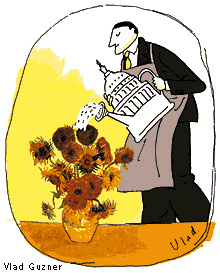Deconstructing the Constitution In Support of the Arts

Most of the arguments for public funding of the arts have been exhausted already, and the concept itself has pretty much fallen out of favor. But historian Garry Wills offered a unique argument last month when he delivered the School of Arts and Sciences’ annual Dean’s Forum lecture. According to Wills, whose Pulitzer Prize-winning Lincoln at Gettysburg was the text for the 1997-98 Penn Reading Project, the case can be made by looking closely at the Constitution.
An often-ignored clause in the Constitution, he said, “tells us something very interesting about the values held by the drafters.” It’s the eighth clause in Section Eight of Article One, and while all it does is authorize Congress to issue patents and copyrights, “it does so in an odd way.” The other powers granted to Congress in Section Eight, Wills explained, are listed in a “standard way, [with] each power stated in the infinitive: to regulate commerce, to coin money, to establish a post office, to declare war …”
In the middle of this run of infinitives, he pointed out, is the patent-and-copyright clause. But unlike the other powers granted, the authors of the Constitution “did not think it sufficient” to say merely: “To secure for a limited time to authors and inventors the exclusive right to their respective rights and discoveries … ” Instead they wrote: “To promote the progress of science and the useful arts by securing for a limited time to authors and inventors the exclusive right to their respective rights and discoveries … ”
That language, argued Wills, “does not just state a power to act — to declare war — it states the goal for the specific power mentioned afterward. This infinitive resembles those in the preamble — ‘to promote the general welfare,’ ‘to secure the blessings of liberty,’ ‘to form a more perfect union … ’ In fact, the copyright clause is a kind of mini-preamble — the only one within the original Constitution. It follows up and makes more specific the general preamble’s words … The actual power is granted in this case, and in this case only, in an instrumental phrase, using the gerund: Congress is to do something by securing for a limited time to authors and inventors, et cetera, et cetera.”
As a result, Will said: “Our government is expressly commissioned by the Constitution to protect citizens’ access to the benefits of artistic creativity. The mini-preamble goes beyond the protection of the individual artist or thinker or inventor, to the encouragement of science and the arts themselves. You only give those rights to the other people because there is a social benefit in the progress of science and the useful arts. Government is, in other words, not warned away from this — as it was from the support of religion — but encouraged to take part in promoting their progress.”
Wills concluded: “So the arts deserve governmental support not because there’s a proven, natural interdependence of fine art and free government. The aim is not to promote democracy but to promote the arts and useful sciences. They are good in themselves.”

